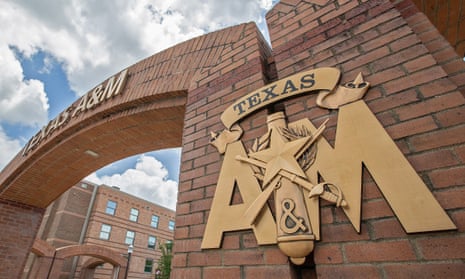Texas A&M University said on Friday its president had resigned, after the hiring of a Black journalist at one of the largest US campuses unraveled amid pushback over her work to promote diversity and inclusion in newsrooms.
Katherine Banks said in a resignation letter she would retire immediately as president, because “negative press has become a distraction” at the nearly 70,000-student campus in College Station.
A&M said Banks told faculty leaders this week she took responsibility for the “flawed hiring process” of Kathleen McElroy, a former New York Times editor who was selected to revive the journalism department.
The statement said “a wave of national publicity” had made McElroy “a victim of ‘anti-woke’ hysteria and outside interference in the faculty hiring process”.
Banks told the Texas Tribune this month opposition surfaced after McElroy was hired, because of her work on race and diversity in newsrooms.
The president’s resignation comes as Republican lawmakers across the US target diversity, equity and inclusion programs on college campuses. In Texas in June, the Republican governor, Greg Abbott, signed a bill dismantling program offices at public colleges.
McElroy’s 20-year career at the Times included research into the relationship between news media and race, notably in newsroom practices, Pulitzer prizes, obituaries and sports.
McElroy did not immediately respond to requests for comment but she told the Tribune she felt “damaged by this entire process” and believed she was “being judged by race, maybe gender. And I don’t think other folks would face the same bars or challenges.”
The Rudder Association, which describes itself as a collection of Texas A&M students, former students, faculty and staff, “dedicated Aggies committed to preserving and perpetuating the core values and unique spirit of Texas A&M”, has acknowledged complaining about McElroy’s hiring to school administrators.
“TRA believes that a department head should embrace the egalitarian and merit-based traditions that characterize Texas A&M’s values, rather than the divisive ideology of identity politics,” the group wrote last week.
McElroy’s job offer to revive Texas A&M’s journalism program, which was celebrated on campus with a “signing party”, was changed from a tenure-track position to a five-year role, then to a one-year job from which she could be fired at any time.
A 1981 Texas A&M graduate, McElroy declined the changes and the job offer, deciding instead to stay as a professor at the University of Texas. At a meeting with university faculty on Wednesday, Banks said she was not involved in the offer changes. The faculty voted to set up a panel to investigate.
On Monday, José Luis Bermúdez, interim dean of the Texas A&M College of Arts and Sciences, also said he would leave his position and return to his job on the faculty.
McElroy said Bermúdez warned her about mounting “hysteria” about diversity, equity and inclusion at A&M and advised her to stay on at UT.
Banks is the second major university president to resign this week amid turmoil.
In California, the Stanford president, Marc Tessier-Lavigne, said on Wednesday he would resign on 31 August, citing an independent review that cleared him of research misconduct but found “serious flaws” in five scientific papers in which he was the principal author.
